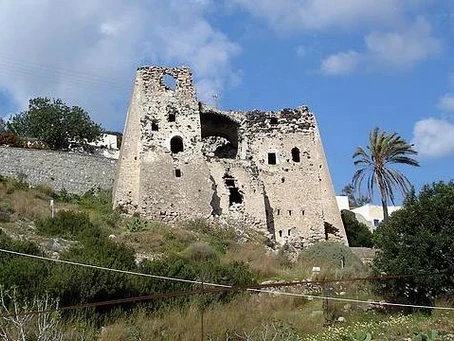
The most famous cliff all over the world, the Caldera of Santorini is a place worth seeing at least once. Nothing compares to the incredible sunset views on the highest edge of the volcano when the sun goes down painting everything the color of gold.
Santorini has more to offer though, it’s not only red, black and white beaches. Among the many things tourist still need to find out about the island is that there are incredible castles to see, also offering impressive panoramic views.
There are five kastelia (castles) in Santorini, they are in Emporio, Oia, Skaros, Akrotiri, and Pyrgos. Most of them were built during the Venetian occupation and their main purpose was to protect inhabitants from the biggest threat of that time, pirate attacks. These are the five castles worth visiting in Santorini.
Castle of Pyrgos

Pyrgos is one of the villages that definitely deserves a visit when in Santorini. Despite being rather towards the center of the island, it’s somewhat elevated position offers a panoramic view that extends to reach the sea.
The castle was built for protective purposes, so it counts with just one entrance. Close to the castle, there are two saints, Theodosia and Isiodion of Theotokos, probably dating back to the 10th century. This second church treasures very valuable icons and a wooden iconostasis. At the highest point of the castle, there is another church which is dedicated to the Virgin Mary, this temple dates back to 1660.
Castle and Tower of Emporio

Not far from Pyrgos, another village that deserves to be seen is Emporio (or Nimporio). Towards the western area of the village, there is a Venetian tower that has been standing there since 1400, and it is said to have been built by the same monks that erected the Holy Monastery of Saint John, on the island of Patmos, in the Dodecanese.
The castle of Emporio has been well-preserved, a lot of its buildings have been restored even though they are not inhabited. After going through the gate, different narrow alleys give shape to a small labyrinth with vertical stairways, bridges, arches, and domes.
One of the castle’s traits are the big towers called Goulas (from the Turkish koules). These were regarded as people’s ultimate shelter in case of attack. The Goulas of Emporio is in the north of the village and connected to the castle through a tunnel.
Skaros

The Rock of Skaros can be spotted from many different areas of the island. It is considered to be the most important castle of Santorini and it was constructed in order to offer protection against piracy. The best point to admire the protruding rock is Imerovigli, and it is possible to reach the area walking from Fira, following the coastal trekking path that keeps going as far as Oia.
According to the history, the Rock of Skaros used to be a medieval village of the island, with a dense population, damaged by different quakes during in the past. According to historians, the earthquakes from 16th to 18th centuries caused significant damage, and the medieval town was then abandoned.
Castle of Agios Nikolaos in Oia

The remainings of this castle can probably be described as one of the most popular places to watch the sunset all over Greece. People arrive at the spot several hours before the sun sets so as to find the perfect place to set their tripods and wait for the best shot to take back home.
This Greek castle is said to date back to the 1400’s and it has also suffered heavily from the different earthquakes that hit the island over the centuries. Mainly, it was the earthquake in 1956 that caused the most damage making part of the area lower to sea level.
Castle of Akrotiri

The castle of Akrotiri has an impressive defensive position, and it’s located towards the south of the island, very close to the Red Beach. It is also known by its Italian name, La Ponta. Back in 1336, the Duke of Naxos offered Akrotiri to the Italian Gozzadini family, who were from Bologna, in Italy. In 1617 the castle was occupied by the Ottomans. Unfortunately, also this fortress was severely damaged by the subsequent earthquakes of Santorini.
source:greekreporter.com


0 Comment